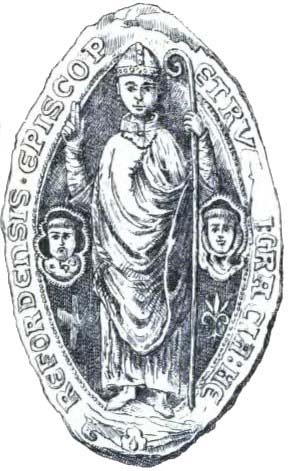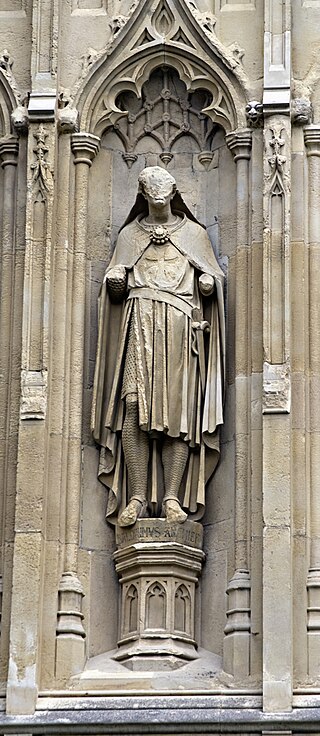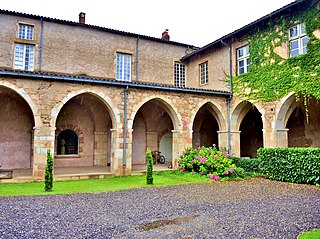Related Research Articles

The Sixth Crusade (1228–1229), also known as the Crusade of Frederick II, was a military expedition to recapture Jerusalem and the rest of the Holy Land. It began seven years after the failure of the Fifth Crusade and involved very little actual fighting. The diplomatic maneuvering of the Holy Roman Emperor and King of Sicily, Frederick II, resulted in the Kingdom of Jerusalem regaining some control over Jerusalem for much of the ensuing fifteen years as well as over other areas of the Holy Land.
John de Gray or de Grey was an English prelate who served as Bishop of Norwich, and was elected but unconfirmed Archbishop of Canterbury. He was employed in the service of Prince John even before John became king, for which he was rewarded with a number of ecclesiastical offices, culminating in his pro forma election to Norwich in 1200. De Gray continued in royal service after his elevation to the episcopate, lending the King money and undertaking diplomatic missions on his behalf. In 1205 King John attempted to further reward de Gray with a translation to the archbishopric of Canterbury, but a disputed election process led to de Gray's selection being quashed by Pope Innocent III in 1206.

Peter des Roches was bishop of Winchester in the reigns of King John of England and his son Henry III. He was not an Englishman, but rather a native of the Touraine, in north-central France.
Ralph Neville was a medieval clergyman and politician who served as Bishop of Chichester and Lord Chancellor of England. Neville first appears in the historical record in 1207 in the service of King John, and remained in royal service throughout the rest of his life. By 1213 Neville had custody of the Great Seal of England, although he was not named chancellor, the office responsible for the seal, until 1226. He was rewarded with the bishopric of Chichester in 1222. Although he was also briefly Archbishop-elect of Canterbury and Bishop-elect of Winchester, both elections were set aside, or quashed, and he held neither office.

Peter of Aigueblanche was a medieval Bishop of Hereford. A nobleman from Savoy, he came to England as part of the party accompanying King Henry III's bride Eleanor of Provence. He entered the royal service, becoming bishop in 1241. He then served the king for a number of years as a diplomat, helping to arrange the marriage of Prince Edward. Peter became embroiled in King Henry's attempts to acquire the kingdom of Sicily, and Peter's efforts to raise money towards that goal brought condemnation from the clergy and barons of England. When the barons began to revolt against King Henry in the late 1250s and early 1260s, Peter was attacked and his lands and property pillaged. He was arrested briefly in 1263 by the barons, before being mostly restored to his lands after the Battle of Evesham.

The Bishop of Exeter is the ordinary of the Church of England Diocese of Exeter in the Province of Canterbury. Since 30 April 2014 the ordinary has been Robert Atwell.

Baldwin of Forde or Ford was Archbishop of Canterbury between 1185 and 1190. The son of a clergyman, he studied canon law and theology at Bologna and was tutor to Pope Eugene III's nephew before returning to England to serve successive bishops of Exeter. After becoming a Cistercian monk he was named abbot of his monastery at Forde and subsequently elected to the episcopate at Worcester. Before becoming a bishop, he wrote theological works and sermons, some of which have survived.
Jocelin of Wells was a medieval Bishop of Bath. He was the brother of Hugh de Wells, who became Bishop of Lincoln. Jocelin became a canon of Wells Cathedral before 1200, and was elected bishop in 1206. During King John of England's dispute with Pope Innocent III, Jocelin at first remained with the king, but after the excommunication of John in late 1209, Jocelin went into exile. He returned to England in 1213, and was mentioned in Magna Carta in 1215.
Savaric fitzGeldewin was an Englishman who became Bishop of Bath and Glastonbury in England. Related to his predecessor as well as to Emperor Henry VI, he was elected bishop on the insistence of his predecessor, who urged his election on the cathedral chapter of Bath. While bishop, Savaric spent many years attempting to annexe Glastonbury Abbey as part of his bishopric. Savaric also worked to secure the release of King Richard I of England from captivity, when the king was held by Emperor Henry VI.
William of Bitton was a medieval English Bishop of Bath and Wells.
Walter Mauclerk was a medieval Bishop of Carlisle and Lord High Treasurer of England.
Robert Passelewe was a medieval Bishop of Chichester elect as well as being a royal clerk and Archdeacon of Lewes.
Alexander de Stavenby was a medieval Bishop of Coventry and Lichfield.
John of Fountains was a medieval Bishop of Ely.
Robert Warelwast was a medieval Bishop of Exeter.

Hugh de Mapenor was a medieval Bishop of Hereford. Although educated and given the title of magister, or "master", the details of his schooling are unknown. Mapenor was a clerk for Giles de Braose, his predecessor as bishop. Later, Mapenor served as Dean of Hereford before being elected as bishop against the wishes of King John of England. During his short episcopate, he supported John's son and successor King Henry III of England, and was active in his diocese, as a number of surviving documents show. He also served as a diplomat for the king.
Hugh Foliot was a medieval Bishop of Hereford. Related somehow to his predecessor at Hereford, he served as a priest and papal judge as well as being an unsuccessful candidate as Bishop of St David's in Wales. In 1219, he was appointed Bishop of Hereford. During his time in office, he mostly attended to ecclesiastical duties, but did occasionally serve as a royal administrator. He helped found a hospital and a priory, and died in 1234 after a months-long illness.
William de Raley was a medieval judge, administrator and bishop. Most historians now believe that he was the author of the great law book Bracton.

The Dean of Exeter is the head of the Chapter of Cathedral Church of Saint Peter in Exeter, England. The chapter was established by William Briwere, Bishop of Exeter (1224–44) who set up the offices of dean and chancellor of Exeter Cathedral, allowing the chapter to elect those officers. The deanery is at 10 The Close, Exeter. The current dean is Jonathan Greener.

Hugh of La Tour-du-Pin was the bishop of Clermont from 1227 until his death.
References
- Barlow, Frank (2004). "Brewer, William". Oxford Dictionary of National Biography (online ed.). Oxford University Press. doi:10.1093/ref:odnb/50339.(Subscription or UK public library membership required.)
- Fryde, E. B.; Greenway, D. E.; Porter, S.; Roy, I. (1996). Handbook of British Chronology (Third revised ed.). Cambridge, UK: Cambridge University Press. ISBN 0-521-56350-X.
- Tyerman, Christopher (1996). England and the Crusades: 1095–1588. Chicago, IL: University of Chicago Press. ISBN 0-226-82013-0.
- Tyerman, Christopher (2006). God's War: A New History of the Crusades. Cambridge, UK: Belknap Press of Harvard University Press. ISBN 0-674-02387-0.
- Vincent, Nicholas (2002). Peter des Roches: An Alien in English Politics 1205–1238 (Reprint ed.). Cambridge, UK: Cambridge University Press. ISBN 0-521-52215-3.